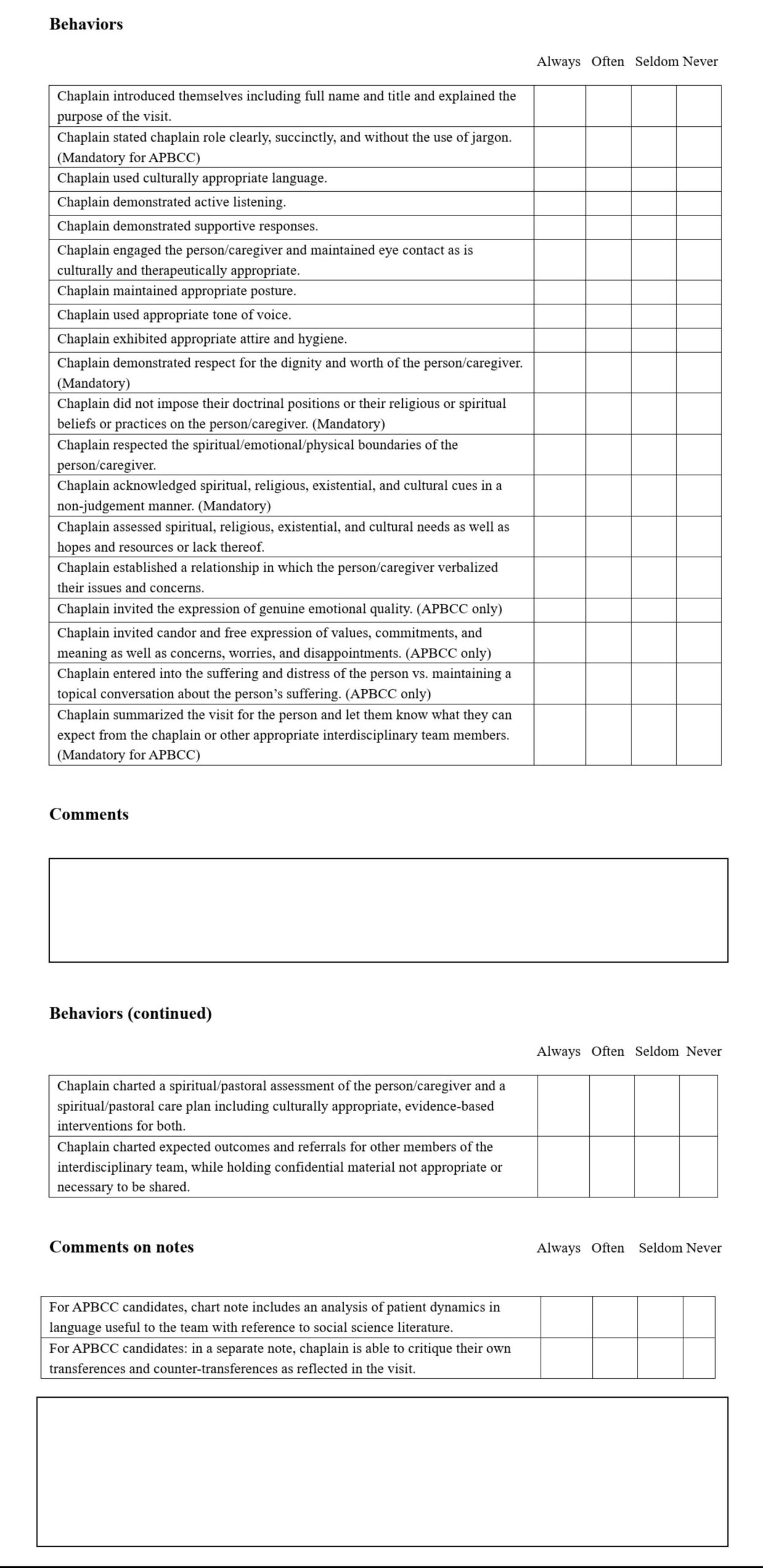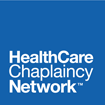General Questions
If you haven’t already done so, you must first become a member of the Spiritual Care Association.
After carefully reviewing the requirements for the certification you are seeking, begin an online application (please note you must be logged in in order to begin an application).
Submit your application online along with all the required supporting documents. You will receive an email once your application and documents have been reviewed and accepted. At this point, you are “pre-approved” to continue to the next phase.
Next phase: you will need to complete (1) the Standardized Clinical Knowledge Test, and (2) the Simulated Patient Exam through a patient encounter. You will have 6 months to successfully pass both the test and the exam (the 6 months begin from the day you receive notification that your documents have been accepted). You can take the test and exam in any order.
The non-refundable application fee varies depending on which certification you are pursuing. Click here for a full listing of all the fees.
If you have any questions during this process, please contact our Certification Administrators at: certification@spiritualcareassociation.org. If you would like to reach the Director of Certification of the Spiritual Care Association, The Rev. George Handzo, BCC, you can reach him at ghandzo@spiritualcareassociation.org. Questions about fees and payments should be sent to Cindy Melero at cmelero@healthcarechaplaincy.org.
Standardized Clinical Knowledge Test
- The APBCC Test has 100 questions. You will have 120 minutes to complete the test. A passing score is 75% or higher.
- The BCC Test has 85 questions. You will have 100 minutes to complete the test. A passing score is 75% or higher.
- The CC Test is 85 questions. You will have 100 minutes to complete the test. A passing score is 65% or higher.
We have prepared a very thorough overview of what is covered in the test. You can find this information in this document’s Appendix 2: What’s in the Test.
Yes, SCA offers a preparation course called, Preparation for Standardized Clinical Knowledge Test for Board Certified and Credentialed Chaplains. Please note: it is not a requirement to purchase this course for certification or credentialing.
It is very important to understand that the questions and the answer options are based on the evidence in the field. That is, every correct answer is evidence-based which means it is supported by research, guidelines, or expert opinion. This evidence may not conform to the way you have thought or done things or even how your institution does things. Put another way, you should answer each question based on what the evidence says rather than based on what you think is the right answer. Thus, your chances of passing the test will be significantly improved if you make sure you are familiar with the literature we have suggested.
While the questions and answer options on the test have been carefully vetted by subject matter experts in the particular content area, we welcome constructive and specific questions and suggestions about the clarity with which the questions or answers are stated and even smaller issues like grammar and spelling. Note that the questions cannot be considered unless the specific text of the question the concern relates to is stated. These questions should be sent directly to the Director of Credentialing and Certification at ghandzo@spiritualcareassociation.org.
Simulated Patient Exam
SCA Exam-Faculty
The specific behaviors below are particulars of an overall relational presence, a demonstrated clinical acuity, and an attitude that scorers will be looking to see the chaplain exhibit. This attitude has been variously called pastoral caring or caring for the human spirit.
Within the visit, the chaplain is expected to exhibit only those behaviors that are appropriate to the case and to avoid behaviors that might be inappropriate to the case.
- Does the chaplain exhibit an evident sense of deep caring for the patient or caregiver’s human predicament?
- Is this attitude clearly therapeutic in the sense of affecting a relationship in which the person feels accepted and understood by the chaplain?
- Does the engagement contribute to the person(s) having a greater sense of comfort, acceptance (even for the unacceptable), connection to self and others, wellness, wisdom, and peace?
- Finally, does the chaplain use their clinical acuity in a caring way to move some or all of these goals forward?
Exams that are BCC and CC are scored in the same manner. Items marked “Mandatory” require a score of Often or Always in order to pass the exam. Items marked “APBCC only” will only be scored for APBCC and APBCC-HPC candidates. Non-mandatory items for APBCC and APBCC-HPC require at least a score of Seldom. All candidates should read the requirements for the chart notes carefully and make sure to include all required elements. APBCC and APBCC-HPC candidates should note that two additional elements are required.

Please email your questions to certification@spiritualcareassociation.org; however, please note that we cannot answer specific questions to your personal case. We can only answer general questions about the process. You will have an opportunity to have your personal case reviewed after you apply.
SCA Exam-Faculty
The specific behaviors below are particulars of an overall relational presence, a demonstrated clinical acuity, and an attitude that scorers will be looking to see the chaplain exhibit. This attitude has been variously called pastoral caring or caring for the human spirit.
Within the visit, the chaplain is expected to exhibit only those behaviors that are appropriate to the case and to avoid behaviors that might be inappropriate to the case.
- Does the chaplain exhibit an evident sense of deep caring for the patient or caregiver’s human predicament?
- Is this attitude clearly therapeutic in the sense of affecting a relationship in which the person feels accepted and understood by the chaplain?
- Does the engagement contribute to the person(s) having a greater sense of comfort, acceptance (even for the unacceptable), connection to self and others, wellness, wisdom, and peace?
- Finally, does the chaplain use their clinical acuity in a caring way to move some or all of these goals forward?
Exams that are BCC and CC are scored in the same manner. Items marked “Mandatory” require a score of Often or Always in order to pass the exam. Items marked “APBCC only” will only be scored for APBCC and APBCC-HPC candidates. Non-mandatory items for APBCC and APBCC-HPC require at least a score of Seldom. All candidates should read the requirements for the chart notes carefully and make sure to include all required elements. APBCC and APBCC-HPC candidates should note that two additional elements are required.

Please email your questions to certification@spiritualcareassociation.org; however, please note that we cannot answer specific questions to your personal case. We can only answer general questions about the process. You will have an opportunity to have your personal case reviewed after you apply.

